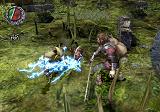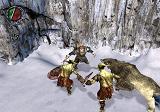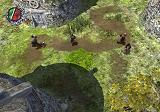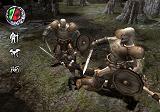|
|
The Bard's Tale
|
|
Review by Ugur Sener
|
 It had been a long and arduous journey. The Bard was sick of fighting seemingly endless hordes of monsters and completing errands for mysterious strangers. He felt weary as he gazed upon the intimidating tower. He really had not seen enough coins to justify the tremendous risks he was taking. His final reward had better be something utterly amazing.
It had been a long and arduous journey. The Bard was sick of fighting seemingly endless hordes of monsters and completing errands for mysterious strangers. He felt weary as he gazed upon the intimidating tower. He really had not seen enough coins to justify the tremendous risks he was taking. His final reward had better be something utterly amazing.
A group of robed figures charged out of the tower. The man leading the charge let the Bard know that it was a mistake to come here. How many times had the exact same threat been made in the last several days? "At least he did not go into a long speech about how he is going to make sure I won't reach the top level of the tower," the Bard thought to himself. His summoned creatures at his side, the Bard braced himself for battle.
Of course, it would be a shame to tell you how that battle ends before you get to experience the aforementioned long and arduous journey. How did the Bard end up at this dark and foreboding tower? What possessed him to confront what appears to be a group of maniacal zealots? After a glimpse of what is to come, The Bard's Tale catapults us into the past, to show us how it all began.
 The Bard was not your average hero. He did not possess visions of grandeur; he did not seek greater glory like a valiant knight. All he ever desired was some gold, a good meal, and a warm place to sleep. The company of a beautiful young lady would not hurt either.
The Bard was not your average hero. He did not possess visions of grandeur; he did not seek greater glory like a valiant knight. All he ever desired was some gold, a good meal, and a warm place to sleep. The company of a beautiful young lady would not hurt either.
He was walking through the small town of Houton when he found himself in front of the Drunken Rat. The local inn always seemed to be a good place to satisfy all of the Bard's needs. It was time to get to work. Pulling out his lute, the Bard played a small magical tune. Called forth by sorcery, a rat curiously appeared in front of the bard. The obedient creature seemed to know the drill. It dashed through the small opening underneath the tavern's door. Just as expected, the Bard heard somebody scream in just a moment.
The ever-heroic Bard rushed in to see who was in trouble. His little summoned rat had done very well indeed. An attractive barmaid was standing on top of a stool, terrified of the vermin. Proclaiming himself a savior, the Bard quickly produced his lute and played a tune to make the summoned creature disappear.
The barmaid was grateful for being saved from the rat. But since the Bard was obviously so efficient at taking care of rat problems, perhaps he would be interested in putting an end to the infestation down in the cellars? Seeing a clear opportunity for a free meal, the Bard agreed to this admittedly cliche task.
 Of course, this would turn out to be different than the average rat hunt deftly placed at the beginning of many a role-playing game. A highly unpleasant surprise was waiting for the Bard downstairs. Between scorching flames, a healthy dose of embarrassment, and the first of many mysterious men to offer him advice, the Bard would start on his epic quest.
Of course, this would turn out to be different than the average rat hunt deftly placed at the beginning of many a role-playing game. A highly unpleasant surprise was waiting for the Bard downstairs. Between scorching flames, a healthy dose of embarrassment, and the first of many mysterious men to offer him advice, the Bard would start on his epic quest.
Developed by InXile Entertainment and published by Vivendi Universal Games, The Bard's Tale offers a somewhat unique and charming action RPG experience to gamers who might feel as though they have seen just about everything the genre has to offer. The game might not be dripping with originality and breaking new ground in every step, but it does possess a witty style that can prove to be endearing. That is, if you are willing to overlook or put up with its less than glamorous aspects.
Before we get any farther however, it should be noted that The Bard's Tale is not a direct sequel to the role-playing game released during the 1980's that bore the same name. While InXile's president Brian Fargo may have been involved with the original game, the similarities are just about limited to the title. The 2004 release of The Bard's Tale is a departure from the original series both in terms of setting and game play. Using the familiar Baldur's Gate: Dark Alliance engine, The Bard's Tale puts the emphasis on action elements as role-playing aspects take the backseat.
From the very beginning, it is very clear that you are not dealing with an ordinary tale of heroism and bravery. The Bard is not some fearless defender against evil, but more of a selfish trickster. He only offers his aid grudgingly if there is promise of a good reward. His cynical attitude and frequent jibes at other characters makes him a rather interesting and entertaining character to control.
 The underlying humorous tone is what sets The Bards Tale apart from many other games in its genre. The situations the Bard encounters are often rather comical. A seemingly innocent quest can have catastrophic consequences. A simple task can lead to considerably more trouble than you first expected. Amidst a broken-hearted villager, a Trow in charge of a 'brilliant' time-travel scam, and a horde of zombie cows and sheep, you never know what absurdity might hit you next.
The underlying humorous tone is what sets The Bards Tale apart from many other games in its genre. The situations the Bard encounters are often rather comical. A seemingly innocent quest can have catastrophic consequences. A simple task can lead to considerably more trouble than you first expected. Amidst a broken-hearted villager, a Trow in charge of a 'brilliant' time-travel scam, and a horde of zombie cows and sheep, you never know what absurdity might hit you next.
Much of the humor comes from the Bard's witty remarks. On many occasions, you encounter people, places, or situations that will be similar to what you might find in any game with a fantasy setting or role-playing elements. Being very well-traveled himself, the Bard will often recognize these elements and crack a couple of jokes that should be appreciated by seasoned gamers.
The interaction between the Bard and the game's narrator can also be rather amusing. The narrator will make occasional sarcastic remarks generally pointing out what a worthless man the Bard is. Since he can somehow hear the narrator, the sharp-tongued Bard does not let very many of these comments slide, coming back with witty responses of his own.
The core storyline in The Bard's Tale is relatively simple. The first few quests have the Bard traveling to areas around the town of Houton as he completes a few tasks and learns how to play new magical songs. Before long however, you will leave Houton and set out for the next town. It is here that you will learn the nature of your main quest.
 At first, it sounds like a simple rescue mission. Take a quick trip to some mysterious magical tower, slay a horde of monsters, and the job is done. Of course, in a video game, things are never quite that easy. Before long, the quest turns into a lengthy journey, with many obstacles you have to overcome before you can reach the final confrontation. While the storyline may not be exceptional, there are several twists and turns to maintain your interest throughout the game.
At first, it sounds like a simple rescue mission. Take a quick trip to some mysterious magical tower, slay a horde of monsters, and the job is done. Of course, in a video game, things are never quite that easy. Before long, the quest turns into a lengthy journey, with many obstacles you have to overcome before you can reach the final confrontation. While the storyline may not be exceptional, there are several twists and turns to maintain your interest throughout the game.
Players also have a chance to decide how some of the scenes unfold. At certain points, you have a chance to dictate the attitude with which the Bard will respond to a question or comment. Speaking to other characters rude or polite tone can have fairly amusing consequences throughout the game. For the most part, your responses will not have an impact on the ultimate outcome of the scene, but you might end up with a few extra items or hear a couple of additional jokes. You might even manage to get yourself a little bit of help in an upcoming fight.
While the humorous dialogues and the often absurd storyline might be a big part of what keeps The Bard's Tale interesting, the majority of your time playing the game will be spent fighting various monsters. The combat featured in the game has two distinct aspects. Players will have to utilize the Bard's melee fighting abilities to fend off many of their opponents. However, since the enemies typically attack you in fairly large groups, you will also have to rely on a series of summoning spells.
The melee fighting is fairly straightforward. You move the Bard around the game world using the analog stick on the controller. There is an attack button that can be used to swing your button and a block button to defend yourself from the strikes of your opponent. You have to time your blocking to the enemy's attack; you cannot simply press and hold the button to avoid multiple strikes. The speed of your attacks will depend on the type of weapon you are using.
 While you will start the game with a simple sword, the Bard will obtain better weapons throughout the game. You can also learn how to use different types of weapons by acquiring various talents when you gain levels. You can learn to wield two-handed weapons that can knock back your enemies or pick up the dual-wielding skill to fight with two weapons. There are also a couple of special weapons that the Bard will come across during his journey. You will not have to learn a special talent to use these weapons. The Bard will be able to use them as soon as he finds them.
While you will start the game with a simple sword, the Bard will obtain better weapons throughout the game. You can also learn how to use different types of weapons by acquiring various talents when you gain levels. You can learn to wield two-handed weapons that can knock back your enemies or pick up the dual-wielding skill to fight with two weapons. There are also a couple of special weapons that the Bard will come across during his journey. You will not have to learn a special talent to use these weapons. The Bard will be able to use them as soon as he finds them.
What sets the fighting and exploration elements of The Bards Tale apart from many other games are the summoning spells that will be at your disposal. By playing whatever instrument he is carrying, the Bard can call forth a number of magical creatures. At the outset of the game, the only creature you will be able to summon is a common rat. However, after making a very small amount of progress, you will learn the first spell that will let you summon a creature that can actually fight for you.
You will not be able to directly control summoned creatures. However, it is possible to give them various commands. Depending on their current situation, the creatures will usually obey your commands immediately. The instrument you have at your disposal determines the number of creatures you can summon at any given point in time. While you can only have one magical creature that aids you at the beginning, before long you will pick up more powerful instruments that will allow you to bring forth multiple allies at the same time.
 A number of the summoned creatures will directly help you in combat by engaging your enemies. For instance, you can summon a heroine that fights with a crossbow. Especially early in the game, she is great at taking out a number of enemies from a distance. On the other hand, you can summon a knight that will face your opponents in melee combat. While your summoned warriors will not win every single fight for you, their presence will often keep some of the enemies at bay, allowing you to personally deal with a smaller number of monsters.
A number of the summoned creatures will directly help you in combat by engaging your enemies. For instance, you can summon a heroine that fights with a crossbow. Especially early in the game, she is great at taking out a number of enemies from a distance. On the other hand, you can summon a knight that will face your opponents in melee combat. While your summoned warriors will not win every single fight for you, their presence will often keep some of the enemies at bay, allowing you to personally deal with a smaller number of monsters.
There are also summoned creatures that can help you indirectly during combat. For instance, the crone is exceptionally useful as she can cast healing spells on you and your other magical allies. Her powerful healing magic can make the difference in many fights when you think you are just about to lose. On the other hand, the bodyguard can be used to fend off against incoming ranged attacks while the knocker can inflict serious damage on your foes with his deadly traps.
In certain areas, you may also need a couple of creatures that do not aid you during fights. You can call upon a fairy to bring light to particularly dark areas where you may not otherwise be able to find your way. In addition, the trap finder can be extremely useful in some of the game's dungeons. If there are too many traps draining your health points, you can summon the trap finder and let him clear the way for you. He will protect you and your other allies by preventing the traps from going off until you walk past them.
The inclusion of the summoning spells does make the fighting more interesting than mowing down one horde of enemies after another with a sword. Especially once you are learn a number of spells and become able to call more than one creature to aid you on the battlefield, a small amount of strategy factors into the combat. You will have to choose effective creature combinations and vary your tactics based on the types of monsters you are facing.
 The summoned creatures also add to the game with their personalities. A couple of them will frequently taunt their opponents. The trap finder can be particularly amusing with all his complaining and his unabashed satisfaction when happen to trigger a trap despite his protection. Even though they will not feel like fully developed characters, it is still nice to see that your summoned allies are a little more than mindless drones.
The summoned creatures also add to the game with their personalities. A couple of them will frequently taunt their opponents. The trap finder can be particularly amusing with all his complaining and his unabashed satisfaction when happen to trigger a trap despite his protection. Even though they will not feel like fully developed characters, it is still nice to see that your summoned allies are a little more than mindless drones.
Without a doubt, the action elements take the center stage in The Bards Tale. However, the game does have role-playing aspects that will influence your effectiveness in combat. For instance, the Bard has six key attributes that can be further developed throughout the course of the game. While the strength attribute determines the amount of damage you can deal with melee weapons, the dexterity attribute will dictate your effectiveness with bows and arrows. A high vitality score will make the Bard able to withstand greater amounts of damage whereas a high charisma will give you a discount at the stores. Indicating how well the Bard can use various musical instruments, the rhythm attribute will give bonuses to your summoned creatures. Finally, a high luck score will have a positive impact on many aspects of the game.
Your initial score in each of the attributes is determined by the difficulty level you choose at the beginning of the game. You also get to distribute a set number of points across the six attributes. As you complete various quests and defeat monsters, you will earn experience points and gradually gain levels. Each time you gain a level, you gain two bonus attribute points. You can continue to increase each category until you reach the maximum score of twenty.
 The way you allocate your attribute points will for the most part depend on how you want to deal with your enemies. If you prefer to face them head on in melee combat, a high strength score will be important. On the other hand, if you want to rely on your summoning spells as much as possible, you may want to max out your rhythm score. However, regardless of your preferences, there will be times where you might simply have to utilize a ranged weapon or directly engage an enemy in melee. As such, you will have to maintain at least a certain degree of balance between the various attributes.
The way you allocate your attribute points will for the most part depend on how you want to deal with your enemies. If you prefer to face them head on in melee combat, a high strength score will be important. On the other hand, if you want to rely on your summoning spells as much as possible, you may want to max out your rhythm score. However, regardless of your preferences, there will be times where you might simply have to utilize a ranged weapon or directly engage an enemy in melee. As such, you will have to maintain at least a certain degree of balance between the various attributes.
In addition to increasing your attribute scores, gaining levels will also give you access to new talents. A number of the talents featured in the game deal with learning how to use various types of weapons. There are also a number of talents that will give you special abilities during fights. For instance, you can learn 'critical strike,' which will give the Bard a chance to inflict heavy damage on his enemies. There are also talents that only become available once you meet their prerequisites. For example, if you acquire the 'dual wield' talent, the Bard will become able to learn 'riposte,' which allows him to respond with a counterattack when he successfully blocks an opponent's strike.
Given its humorous tone, fairly entertaining action elements, and interesting summoning dynamics, The Bard's Tale certainly sounds like a pretty decent game. It does not disappoint from a presentation point of view either. They may not exactly be exemplary, but the graphics get the job done. The character models and a few of the areas can be a bit lacking at times, but some of the environments a well-crafted with a lot of attention to detail. The voice acting is great for the most part. The voices seem fitting for the characters and the lines are usually delivered effectively. Even though it may not be exceptionally memorable for most players, the soundtrack suits the game's lighthearted fantasy setting.
 There are also a number of segments where you will encounter a group of characters singing a song with fairly amusing lyrics. Whether the other characters are praising the Bard for the horrible things he has inadvertently caused or proclaiming "it's bad luck to be [the Bard]," these sections certainly enhance the game's atmosphere. They also seem very appropriate for a game whose protagonist is a bard.
There are also a number of segments where you will encounter a group of characters singing a song with fairly amusing lyrics. Whether the other characters are praising the Bard for the horrible things he has inadvertently caused or proclaiming "it's bad luck to be [the Bard]," these sections certainly enhance the game's atmosphere. They also seem very appropriate for a game whose protagonist is a bard.
Unfortunately, The Bard's Tale does have a number of problems. First of all, going through some of the areas featured in the game feels like a tedious chore. There are times where you fight one or two types of monsters over and over again as you cover a fairly large area. Some of the dungeons seem to drag on for too long before you are rewarded with a cut-scene that unravels more of the story. Some more variations in level design or the inclusion of several more types of enemies would have been much welcome. A few more side quests players could perform while exploring various areas or some more characters the Bard could talk to would have been helpful as well.
The game could have also used a little more room for character customization. While players do have the ability to dictate attribute scores, select talents, or pick the weapon they would like to use, it never feels as though you truly have freedom to develop your character in various different ways. It would have been nice to have additional choices for equipment and a more diversified list of talents with some more specialty skills. The benefits from increasing various attribute scores should have also been a little more noticeable.
In the end, The Bard's Tale is a charming game that is hurt by a series of problems. The storyline does not include a great deal of depth. Some of the dungeons become a little tiresome to explore. Players do not have as much freedom as they could in terms of customizing their characters. On the other hand, the game has a number of strong elements as well. Even though it might grow a little stale after a while, the humor is for the most part entertaining. Using musical instruments to summon creatures makes for some interesting game play mechanics. There is plenty of game play time with a lengthy main quest and a number of bonus areas to explore. Overall, The Bard's Tale does not have the makings of an unforgettable action RPG experience. However, it is still an interesting game with a pleasant lighthearted atmosphere that can keep you entertained for quite a number of hours.
  
|
|
|
|
